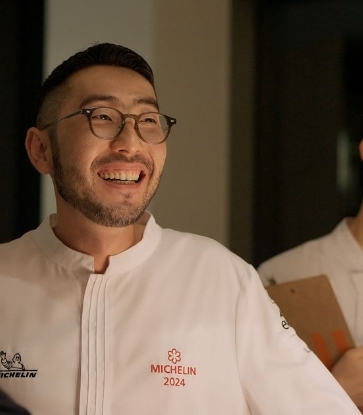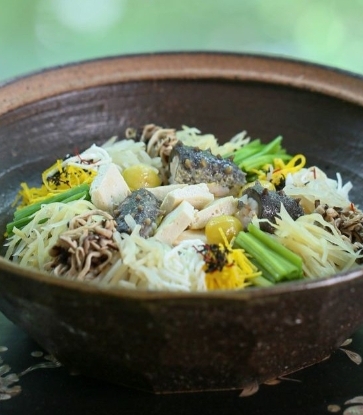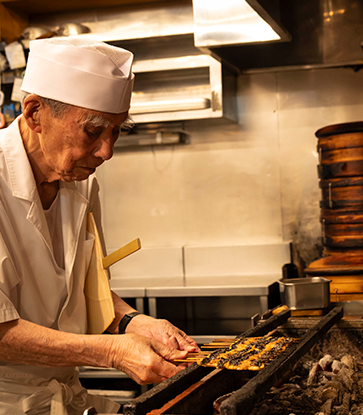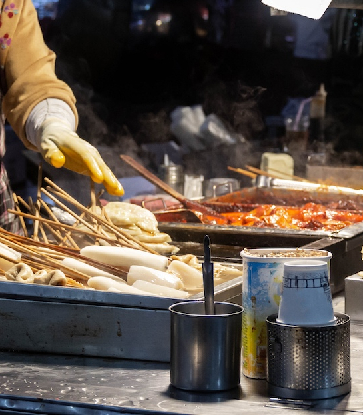Joseph Lidgerwood’s decision to join Netflix’s culinary show Culinary Class Wars intrigued many who knew him for his refined, ingredient-driven approach to Korean cuisine. Why would a chef at the height of his career step into the competitive fray of reality television? For Joseph, it was all about growth and the challenge of expanding his culinary reach. “I wanted to push myself and introduce Korean ingredients to a broader audience,” he explains. This journey wasn’t just about competition—it was a chance for him to bring a fresh perspective to Korean flavors, challenging preconceptions and embracing the thrill of cooking outside his comfort zone.
“Kitchens are hard enough; you don't need to bring excess ego into it. We're serious about the food, but we keep it light-hearted to retain our staff.”
Many were surprised to see a MICHELIN-starred chef like yourself on Culinary Class Wars. Could you share what inspired you to join the show?
Joseph: I think for me I wanted to keep pushing myself and to find a good outlet to showcase Korean ingredients to a wider range of people. It’s true that participating in a competition like this brings a certain level of risk. There’s definitely a fear factor involved—you do have a lot to lose. But for me, the position I’m in with EVETT is still a journey of growth. I’ve never thought, “We’ve made it; we’re complete.” That’s not my mindset. Joining the show seemed like a great way to push myself, both as a chef and a creative, and not just settle into what we’re doing now.
You mentioned this idea of ongoing growth. What did you hope to learn from the show?
Joseph: We didn’t have much information going in. They [the producers] told us it would be similar to Physical 100, which was pretty popular in Korea, but with chefs. I really wanted to get back into that adventure mode. Before EVETT, I ran a pop-up restaurant group, traveling around and doing these pop-ups globally. That kind of environment really energizes me. At EVETT, we have this framework—certain ingredients, specific courses. But when you’re thrown into something without all those restrictions, it rejuvenates you. There’s freedom to break out and just cook. That’s what I missed and wanted to experience again.
So, it was like a clean slate for you. Did that approach influence the dish you created on the show?
Joseph: Absolutely. The show was heavily ingredient-driven, so I didn’t know what I’d be working with until I had it in my hands. I had just done a pop-up in Kyoto, where people assumed Korean food was all spicy and red. I wanted to show the range Korean cuisine has. Not everything is red and spicy—there are delicate notes too. That’s something I’ve always tried to do at EVETT as well, which is exploring and celebrating the nuances of Korean flavors. I’m not from Korea, so I approach these ingredients with fresh eyes. But the heart and essence of what we create are very much aligned with Korean sensibilities. It might be different, but I want it to feel like it belongs here. Making the unfamiliar familiar—that’s a big part of what we bring to the dining scene.
Read more: The First Day We Got Our Stars: Joseph Lidgerwood
Could you take us through the dish created on the show? It would be great to hear a deep dive into the thought process and how everything came together.
Joseph: The dish centers on Korean eel, with flavor profiles that blend both European and Korean influences. When I’ve cooked with eel in the UK, there’s a tendency to pair it with horseradish and apple, which is why I included nasturtium leaves and fresh apple—they complement each other well. But in Korea, some of the best eel dishes I’ve had come from areas where the river meets the ocean, in brackish water. They often pair eel with bokbunja, which adds a unique sweetness.
For this dish, I roasted the eel over charcoal and glazed it with bokbunja. The glaze pairs well with a white sesame sauce, which I prefer over toasted sesame for its cleaner flavor. I also added perilla leaf, or get-nip, which I think deserves more appreciation. You usually get it for free at Korean barbecue restaurants, but it’s such a fantastic aromatic leaf—similar to shiso in Japan, which you wouldn’t get for free there. I wanted to showcase the perilla’s depth in a way that still feels like a refined restaurant dish. When you see the dish, you can tell it has that restaurant approach, which is ultimately how I like to cook.
Would you have done anything differently now that you're looking back at the experience?
Joseph: The parameters of the show were challenging, and I didn’t realize there would be almost a two-hour delay between plating my dish and it being tasted. I’ve done cooking competitions before, so I understand how they work, but that long wait really affected the dish’s experience. I wanted to serve the sauce tableside, pouring it fresh, but after sitting for two hours, the eel had dried out. Naturally, that impacted the quality, though that’s something everyone says when they lose. Still, I’m happy with what I presented. They don’t tell you in advance that it’s going to be a one-bite, blindfolded tasting, which would’ve been helpful to know. My dish is more suited for a course menu where there’s time to build a story with highs and lows. If I’d known it’d be one bite, I might’ve done something spikier, but I wanted to showcase a clean, lighter style. In the end, I felt good about it. The reaction has been positive, which is encouraging, too.
Could you tell us about a memorable behind-the-scenes moment? Something viewers might not have seen but which left a lasting impression on you.
Joseph: Honestly, there were so many memorable moments. Despite the competition, the chefs were incredibly friendly and displayed great sportsmanship. My favorite part was always the lighthearted banter while lining up to enter the studio.The long hours of filming really stripped us down to our authentic selves. There was no keeping up a persona after a long day. We shared everything—someone brought an espresso machine, another brought ramen. We were all in it together, facing the same challenges. By the end, it felt less like a rivalry and more like a collective effort. Even now, we have a group chat, and we still keep in touch.
In the show, you keep things light and foster camaraderie, even in tough times. Do you bring that same approach to your kitchen?
Joseph: Exactly. Well, we have a very international team, so we always try to keep it as light as we can. Kitchens are hard enough on their own; they don’t need extra layers of ego. We take the food very seriously, and we’re serious about the guests coming in, but when it comes to our work environment, we like to keep things more relaxed. We spend a lot of hours together, and if we can make those hours enjoyable, it really helps with staff retention. I believe that’s why people stick around—because it’s a positive place to work, without a strict top-down approach all the time.
What efforts do you put into studying and sourcing Korean ingredients?
Joseph: My job at EVETT is all about finding new ingredients and creating dishes around them. Recently, we made a dish called “Myongin’s Table,” highlighting ingredients from four masters in Jeollanam-do. We went down, met each artisan, learned their methods, and then sourced those ingredients directly. I’m very interested in Korean history, so we’re also working on a “King’s Table,” inspired by how Korean kings used to eat. We’re consulting with a professor and then meeting with someone who specializes in that culinary style. It takes about a month to develop each new dish, and we change our menu weekly. Meeting new people and continuously evolving our menu is what keeps things exciting.
Read more: [ONE/ONE] A Deeper Dive into EVETT’s inspiration


















